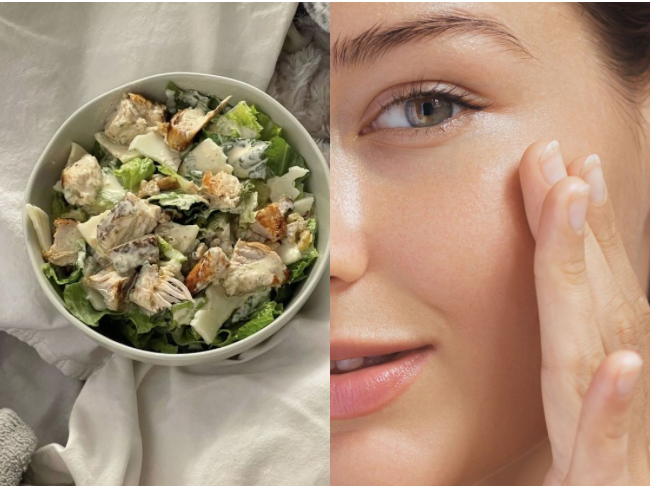The Impact of Diet on Skin Health
- skinwfa
- Jul 20, 2024
- 3 min read
Written by: Nisha Evangelista

Our skin is the body's largest organ, often reflecting our overall health. While having a consistent skincare routine plays a huge role in maintaining skin health, the importance of diet cannot be understated. What we consume directly influences our skin's appearance, resilience, and aging process. In this article, I researched the connection between diet and skin health and highlighted key nutrients and dietary habits that can help you achieve radiant and healthy skin.
1. Hydration: The Foundation of Healthy Skin
Proper hydration is essential for maintaining skin elasticity and texture. Water helps flush out toxins, supports cellular functions, and keeps the skin plump and moisturized. Aim to drink at least eight glasses of water daily, and consider incorporating hydrating foods like cucumbers, watermelon, and oranges into your diet.
2. Antioxidants: The Skin’s Shield
Antioxidants protect the skin from oxidative stress caused by free radicals, which can lead to premature aging and skin damage. Foods rich in antioxidants include:
- Vitamin C: Found in citrus fruits, strawberries, bell peppers, and broccoli, vitamin C helps in collagen production and skin repair.
- Vitamin E: Present in nuts, seeds, and leafy greens, vitamin E protects the skin from UV damage and promotes healing.
- Beta-Carotene: Found in carrots, sweet potatoes, and spinach, beta-carotene converts to vitamin A in the body, supporting cell turnover and skin health.
3. Omega-3 Fatty Acids: The Anti-Inflammatory Agents
Omega-3 fatty acids are essential fats that help reduce inflammation, which can exacerbate conditions like acne, eczema, and psoriasis. They also keep the skin supple and moisturized. Include sources such as:
- Fish: Salmon, mackerel, and sardines are rich in omega-3s.
- Plant Sources: Flaxseeds, chia seeds, and walnuts provide a plant-based omega-3 boost.
4. Protein: The Building Block
Protein is vital for the repair and regeneration of skin cells. Amino acids, the building blocks of protein, are necessary for collagen production, which maintains skin strength and elasticity. It is critical to ensure you get enough protein from sources like chicken, turkey, and lean cuts of beef. Plant-based protein sources include lentils, beans, tofu, and quinoa.
5. Probiotics: Gut Health and Skin Health Connection
A healthy gut microbiome can significantly impact skin health. Probiotics, found in fermented foods, help balance the gut flora, reducing inflammation and promoting a clear complexion. Incorporate foods like:
- Yogurt: Opt for unsweetened, live-culture yogurt
- Fermented Foods: Sauerkraut, kimchi, and kefir
6. Avoiding Sugar and Processed Foods
High sugar intake and processed foods can spike insulin levels, leading to inflammation and breakouts. They also contribute to the breakdown of collagen and elastin, accelerating the aging process. Minimize consumption of:
- Sugary Drinks and Snacks: Sodas, candies, and pastries.
- Highly Processed Foods: Fast food, packaged snacks, and processed meats.
7. The Role of Vitamins and Minerals
Certain vitamins and minerals are particularly beneficial for skin health:
- Zinc: Found in shellfish, pumpkin seeds, and legumes, zinc helps in healing and reducing inflammation.
- Selenium: Present in Brazil nuts, eggs, and whole grains, selenium protects against oxidative damage and infection.
- Biotin: Essential for maintaining healthy skin, hair, and nails, biotin can be found in eggs, nuts, and seeds.
Conclusion
Diet plays an integral role in maintaining and improving skin health. By consuming a balanced diet rich in water, antioxidants, omega-3 fatty acids, protein, probiotics, and essential vitamins and minerals, you can support your skin from the inside out. Conversely, minimizing sugar and processed food intake can prevent inflammation and premature aging. Remember, the journey to healthy skin starts from within, so nourish your body with the right foods to achieve that radiant, glowing complexion.
By understanding and implementing these dietary principles, you can enhance your skin’s health and appearance, achieving a natural, vibrant glow that reflects your overall well-being.
Citations: https://www.sciencedirect.com/science/article/abs/pii/S0899900723003787#:~:text=Certain%20foods%20and%20drinks%20such,challenge%20to%20disease%2Dprone%20skin.
Disclaimer: Everything posted on our website and Instagram is intended for basic educational purposes only. If you suspect you have symptoms of any condition, it is essential to consult a dermatologist or your healthcare provider for a proper diagnosis and treatment plan. Our content is not a substitute for professional medical care.




Comments